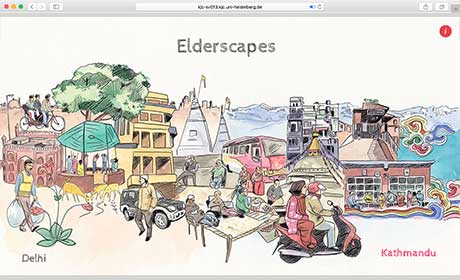Interactive Online Documentary: Ageing in urban Asia
12 February 2016
What is life like for older people in Asian cities and what changes do they observe in their environment? This is explored in the online documentary “Elderscapes”, a transmedia production by researchers from the Cluster of Excellence “Asia and Europe in a Global Context” at Heidelberg University. In the context of the research project “Ageing in a Transcultural Context” they accompanied older people in Delhi (India) and Kathmandu (Nepal), interviewing them about their everyday life, their social bonding and their perspectives. The resulting short films and texts are presented in an online documentary. It is openly accessible at www.uni-heidelberg.de/elderscapes.
“Cities are growing rapidly in Asia today and the number of senior citizens is simultaneously rising. We are studying the way society adapts to the new circumstances and analysing the forms taken by both urban change and evolving family structures,” says anthropologist Annika Mayer. She explains that the majority of older people in Asia live with their joint families. Yet an increasing number of middle-class senior citizens are left to themselves. One reason is the migration of young people – when they go abroad they can only look after their older relatives from a distance. Consequently, Annika Mayer concludes, family structures are changing and new forms of care and support are emerging.
In the course of this change, the number of old age homes for senior citizens is rising. At the same time, there are signs of stronger social networking, as documented by several films in this research project. In Delhi, for example, senior citizens meet in a big park for yoga and a chat. A group excursion to a temple also offers an opportunity for social interaction. This happens e.g. in the Doleshwor Mahadev temple near Kathmandu, the capital of Nepal. Here the anthropologist Roberta Mandoki conducted many interviews with older people, asking them how they coped with these changing circumstances in their everyday life. “The memories of older people reveal both their personal way of life and also the way the city has changed. That way we learn a lot about their relations to the city and also about urban dynamics.”
“Elderscapes. Ageing in Urban South Asia” is an interactive, graphically structured online documentary which follows approaches from visual anthropology. Its interconnected film clips that are combined with text elements enable the viewers to individually appropriate information and knowledge. The documentary was devised by Roberta Mandoki, Annika Mayer and filmmaker Jakob Gross. The two researchers are doctoral students in the research project “Ageing in a Transcultural Context”, part of the Cluster of Excellence “Asia and Europe in a Global Context”. The project’s academic supervisors are Prof. Dr. Christiane Brosius, anthropologist, Prof. Dr. Axel Michaels, indologist and Prof. Dr. Andreas Kruse, gerontologist.


